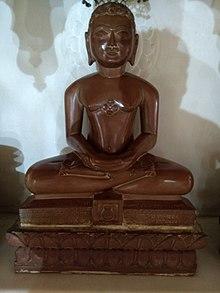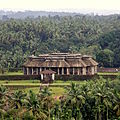| Mallinatha | |
|---|---|
19th Jain Tirthankara | |
 SriMallinatha statue at Anwa, Rajasthan | |
| Venerated in | Jainism |
| Predecessor | Aranatha |
| Successor | Munisuvrata |
| Symbol | Kalasha[1] |
| Height | 25 dhanusha (75 meters) |
| Age | 56,000 years |
| Color | Blue |
| Personal information | |
| Born | |
| Parents |
|
Mallinatha (Prakrit Mallinātha, "Lord of jasmine or seat") was the 19th tīrthaṅkara "ford-maker" of the present avasarpiṇī age in Jainism. Jain texts indicate Mālliṇātha was born at Mithila into the Ikshvaku dynasty to King Kumbha and Queen Prajnavati. Tīrthaṅkara Māllīnātha lived for over 56,000 years, out of which 54,800 years less six days, was with omniscience (Kevala Jnana).[2]
Mallinatha is believed to be a woman named Malli Devi by Shvetambara Jains while the Digambara sect believes all 24 tirthankara to be men including Māllīnātha. Digambara tradition believes a woman can reach to the 16th heaven and can attain liberation only being reborn as a man. Digambara tradition says Mallinatha was a son born in a royal family, and worships Mallinatha as a male.[3][4] However, the Shvetambara tradition of Jainism states that Māllīnātha was female with a name Malli bai.[5]
According to Jain beliefs, Mālliṇātha became a siddha, a liberated soul which has destroyed all of its karma.[6]
Literature
- Jnatrdharmakathah gives the story of Lord Mallinath, which is said to be composed by Ganadhara Sudharmaswami.
- Mallinathapurana was written by Nagachandra in 1105 CE.[7]
Main temples
- Mannargudi Mallinatha Swamy Jain Temple is a Jain temple in Mannargudi, an ancient town in the erstwhile Chola Empire of Tamil Nadu.
- Chaturmukha Basadi is a famous Jain temple located at Karkala in the Indian state of Karnataka. The temple is dedicated to Tirthankar Aranatha, Mallinath and Munisuvratnathswami.[8]
See also
Citations
- ^ Tandon 2002, p. 45.
- ^ Vijay K. Jain 2015, p. 203.
- ^ Dundas 2002, p. 56.
- ^ Umakant P. Shah 1987, pp. 159–160.
- ^ Vallely 2002, p. 15.
- ^ Jaini 1998, p. 40n.
- ^ Ashton 1976, p. 20.
- ^ Sandhya, C D’Souza (19 November 2010), Chaturmukha Basadi: Four doors to divinity Last updated, Deccan Herald
Sources
- Johnson, Helen M. (1931), Mallināthacaritra (Book 6.6 of the Trishashti Shalaka Purusha Caritra), Baroda Oriental Institute
- Dundas, Paul (2002) [1992], The Jains (Second ed.), London and New York: Routledge, ISBN 0-415-26605-X
- Jain, Vijay K. (2015), Acarya Samantabhadra's Svayambhustotra: Adoration of The Twenty-four Tirthankara, Vikalp Printers, ISBN 978-81-903639-7-6, archived from the original on 16 September 2015,
 This article incorporates text from this source, which is in the public domain.
This article incorporates text from this source, which is in the public domain. - Jaini, Padmanabh S. (1998) [1979], The Jaina Path of Purification, Delhi: Motilal Banarsidass, ISBN 81-208-1578-5
- Shah, Umakant Premanand (1987), Jaina-rūpa-maṇḍana: Jaina iconography, Abhinav Publications, ISBN 81-7017-208-X
- Tukol, T. K. (1980), Compendium of Jainism, Dharwad: University of Karnataka
- Vallely, Anne (2002), Guardians of the Transcendent: An Ethnology of a Jain Ascetic Community, University of Toronto Press, ISBN 978-0-8020-8415-6
- Tandon, Om Prakash (2002) [1968], Jaina Shrines in India (1 ed.), New Delhi: Publications Division, Ministry of Information and Broadcasting, Government of India, ISBN 81-230-1013-3
- Ashton, Martha Bush (1976), Yakshagana, Abhinav Publications, ISBN 9788170170471


